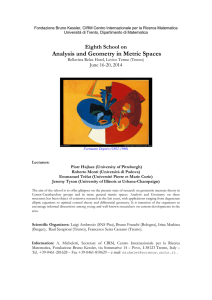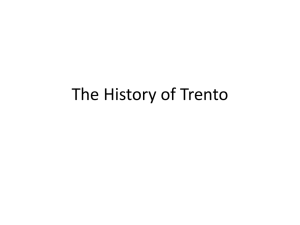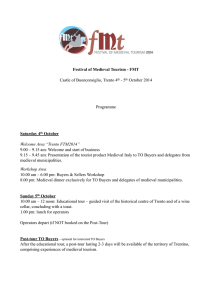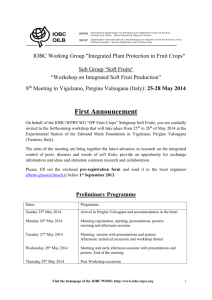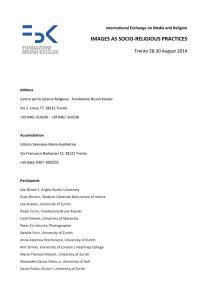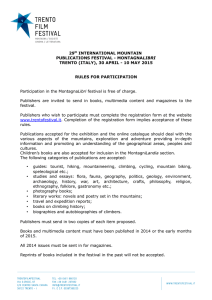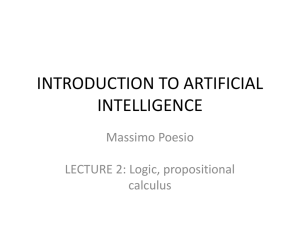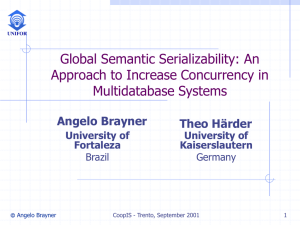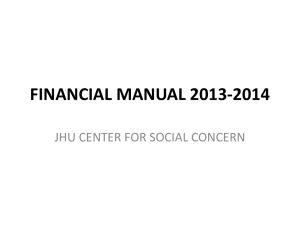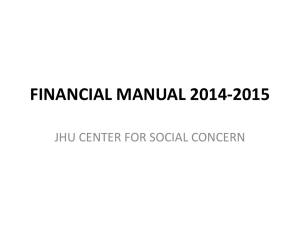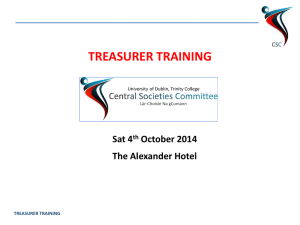Trento City of Scientific Culture Case study
advertisement
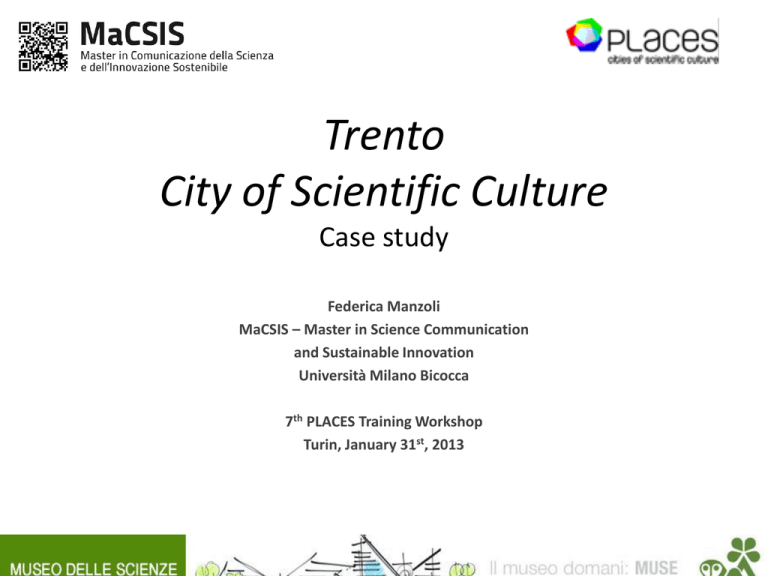
Trento City of Scientific Culture Case study Federica Manzoli MaCSIS – Master in Science Communication and Sustainable Innovation Università Milano Bicocca 7th PLACES Training Workshop Turin, January 31st, 2013 The case study: Trento as a city of scientific culture Understanding our knowledge society studying the places where science and society meet • PLACES aim: to identify dymnamic models of cities of scientific culture (CSC) • My aim: to study the features of Trento as a CSC and focus on the “transferrable lessons (not transferrable solutions)” (Tuff) • PLACES Impact Assessment Toolkit: desk analysis and in-depth interviews (political sphere) http://www.openplaces.eu/resources/places/80649 Trento as CSC - Case Study 2 The Trento Province • • • • • To study a CSC: clear map of the actors, their connection Population: 524.8626, 115.511 in Trento (2009) Territory,: 11 districts mainly mountainous Economy: based on tourism and agriculture Administration: Autonomous Province (the financing of science in society activities comes easily from public funds rather than private investments). Local scientific and technological culture based on environment, climate and sustainability local politics Trento as CSC - Case Study 3 Presence of important scientific institutions The local institutions have a role from a political point of view. The history of this place tells also about the investments in research. Here the slogan of basing the economy on the knowledge has a substance, in the University, in the two big Foundations [Fondazione Bruno Kessler and Fondazione E. Mach]. The university in it self was born from a provincial institute. All the public schools are not depending from the Italian central State, but from the Province… University: funded by the Province • 10 departments • Degree titles 1962-2011: 39.655 • Enrolled 2011/2012: 16,331 • Professors and reseachers: 563 • Administrative and technical staff: 656 • PCs: 956 COSBI The Microsoft Research–University of Trento Centre for Computational and Systems Biology (COSBI) is applying computer science to the development of modeling, simulation, and analysis tools for understanding the behavior of biological systems. Trento as CSC - Case Study 4 Presence of important scientific institutions FBK – Bruno Kessler Foundation The Fondazione Bruno Kessler (FBK), is a private non-profit research centre working for the public interest. Research in the areas of Information Technology, Materials and Microsystems, Mathematics, Italo-Germanic Historical Studies and Religious Sciences, Networking and Telecommunications, and studies on the effectiveness of public policies. Over 350 researchers, 220 between students working on their thesis, doctorate students and visiting scientists combined; 8 international Research Centers; 7 laboratories, including a Microtechnologies laboratory fully equipped for the production of silicon devices ; 11 between spinoffs and start-ups combined Trento as CSC - Case Study 5 Presence of important scientific institutions FEM – Fondazione Edmund Mach The Istituto Agrario San Michele promotes and carries out research, scientific experiments, education and training activities as well as providing technical assistance and services to companies. These activities are aimed at promoting cultural and socio-economic growth in the agricultural sector and at developing the forestry and agro-alimentary systems, with particular regard for the environment and the safeguard of the territory of the Trentino region. Trento as CSC - Case Study 6 Presence of important scientific institutions Technological transfer Trento Rise: a single organizational body that connects several of the major actors in ICT research, education and business in the Trento region, including, among others, FBK and the University of Trento, with the aim to foster start-up initiatives and new research ideas and experimentations to breach the gap between technologies and single applicative domains. Trentino Sviluppo: Aim to foster the sustainable development of Trentino by taking action and providing services aimed at supporting the growth of business skills and the capacity for innovation in the province through the promotion of its competitive features , operating on the basis of a network system and in accordance with the principles of business skill, innovation, social cohesion and the quality of life, work and the environment, in order to build the Trentino of the future. Trento as CSC - Case Study 7 Policies • • • Focus on sustainability Value to the local research Prominence of the Province Provincial law “Trentino for the climate protection”: frame aimed to develop a local sustainable economy, agriculture, tourism, and also to communicate to the citizen. “… The network monitoring the climate is based on locally based focal points. The network promotes the Trentino Climate Observatory, with the aim to develop the knowledge on the evolution of climate phenomena and to communicate and disseminate it, also involving other competent entities” (09/03/2010, art. 5). Trento as CSC - Case Study 8 Economical support to SCIPs • • • Main sources of funds: Province Bank foundations: important but minor role in comparison Private companies; no real interest in communication yet. Main supporters are the bank foundations, which periodically bring out calls to finance cultural projects. But nothing in the private sector can compete with the public money coming from the TAP. (cultural manager) We do not have big industries financing the research, as FIAT in Piemonte to give an example, the Province has to play as the skeleton of the body. In the future, instead, it will decrease and the private contribution will grow (administrator). We are Province-dependent and this is a problem and an advantage. We have one of the highest rate of public investments in research, but of the lowest for private ones. To work in communication means for me to reduce this gap (communicator). • Future new promising forms of public/private collaboration Trento as CSC - Case Study 9 Public participation and Cultural Identity • Environment-oriented Our land is the citizenship, the inner landscape. If with innovation we mean the introduction of best practices in favour of the quality of the environment, in this sense citizens are part of an innovation society and the work of communication on sustainability strongly influences it… We have big research institutes here and they start to be better perceived by the population, fact that take them closer to an innovation society (administrator). • Innovation Society Citizens of Trentino do not perceive to be part of the innovation society, but of an efficient system. I give you an example: when I arrived at the COSBI [Centre for Computational and System Biology], some citizen of Povo [the small town where the Centre is located] came to make sure that scientists weren’t experimenting with animals. (communicator). • No real influence (but with their votes to the politicians…) I’m not able to think of any direct influence of the common citizens to policies related to S&T. More influence, even not direct, is in environmental issues. It seems as we completely trust in our administrators (cultural manager). • TAP Statistical Service (2009) “The perception of the impact of the scientific research in Trentino” Trento as CSC - Case Study 10 Communication Activities • Importance of local media as opinion leaders • Growing participation of local scientists in SC events • Growing investments in communication by the scientific institutions • Wide offer of labs and activities for the schools • Platform for the implementation of local SCIPs MUSE Hub of creativity, sustainability, industrial technology showcase, but also of integration, mitigation of conflict agora of Trento’s citizens Core activity of the new Science Centre to promote participated research among different stakeholders on current questions that citizens are facing, with the final goal to “contribute in creating a citizenship which recognizes itself the proposed politics… in creating a cultural welfare for citizens adn build a sense of citizenship”. Trento as CSC - Case Study 11 Trento (dynamic) model • Scientific institutions: eccellence in environment, IT, agriculture • Policies and politics: main topic are policies to foster the environmental protection and sustainability; law “Trento for the climate protection” (2010) formally addressing SCIPs • Funding: Province, minor role of bank foundations, aim to reach a better public/private collaboration • Science Communication: presence of MUSE at the centre of the policy making + opening of the new science centre • Public participation: focus on environmental issues, improvable • Relatively good collaboration among different actors in the field of the scientific research (university, scientific institutes, museum). Challenge setting up better local network comprising all actors playing a role in science communication, from the Municipality to the local hospital, to ensure coordination soas to Trento CSCmaximise - Case Study their efforts 12 Trento Transferrable Lesson? Trento represents a model of CSC based on • a strong science communication centre (MUSE) • on the ground of a solid environmental tradition and • excellent scientific institutions, • a model of funding based on the public support. Unique experience? What to communicate to the stakeholders in your town? Enlightenments? Trento as CSC - Case Study 13 THANKS • to the interviewees: Laura Boschini, Massimiano Bucchi, Elisabetta Curzel, Michele Lanzinger, Franco Miglietta, Davide Modena, Osvaldo Negra, Michele Nulli, Alberto Pacher, Assessorato alla cultura della Provincia di Trento • to Agnes Allansdottir, who crucially contributed to the research, elaborating the methodology and reviewing my text • to Antonia Caola, who helped me in setting the research and is crucially contributing to the opening of the new MUSE • to all the colleagues who collaborated to the making of the PLACES Impact Assessment Toolkit, and to Gema Revuelta of Universitat Pompeu Fabra in particular Trento as CSC - Case Study 14 MUSE WILL OPEN July 27th 2013 Trento as CSC - Case Study 15
